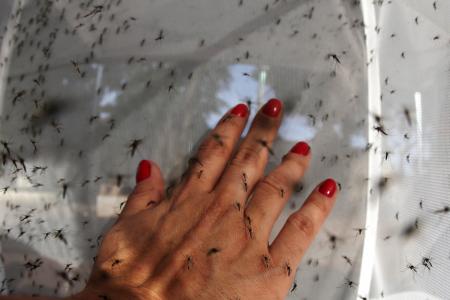Genetically-modified mosquitoes released in China
You know it as dengue.
Victims of this illness - otherwise known as break-bone disease - will tell you that the pain they suffer is extremely severe.
No vaccine or treatment is available for dengue haemorrhagic fever and it has killed about 22,000 deaths a year worldwide, affecting mostly children.
To combat widespread dengue fever in Guangzhou, scientists have infected mosquitoes with bacteria and released half a million of these harmless insects to "take out" other deadly mosquitoes.
Whether this trial becomes a scientific breakthrough remains to be seen.
So far, according to IFLScience, this has been tested out in the Cayman Islands, Brazil and Malaysia.
It has been reported that four months of release of the genetically-modified mosquitoes caused a 85 per cent reduction in the mosquito population.
So how does it work?
The Guardian and The Hindu reported that the released mosquitoes have been infected with wolbachia bacteria which causes the males to be sterile.
Sterile mosquitoes lose the ability to carry dengue.
When they mate with other females, they won't produce offspring and the result of this is that the population of the deadly mosquito will be reduced eventually.
Interestingly, these infected creatures do not bite.
The Chinese government has not yet approved of the release of sterile mosquitoes but they were open to this trial because Wolbachia bacteria also naturally occurs in many insects.
As part of a two-prong attack on the deadly mosquitoes, the females which have been infected with the Wolbachia bacteria also have their own job to do.
A few of these females will be released to replace those that can transmit dengue so that the majority of the mosquito population are not dengue carriers.
The World Health Organisation's Dr Raman Velayudhan said: "In terms of the number of people who fall sick, dengue and malaria are very similar. Dengue affects 128 countries; malaria 97. The neglect I think comes because dengue doesn’t kill as many people."
Currently, a team of researchers are driving around Guangzhou and releasing mosquitoes from plastic pots on their trucks.
Some of the residents of the small island in the south of China are finding the scientists a welcome sight.
Said Michigan State University's Xi Zhiyong, who heads the project: "Some residents have even asked to get mosquitoes from us to release in their own home."
China's worst outbreak of dengue fever in two decades happened last year with Guangdong province reporting almost 47,000 cases.
Before 1970, only nine countries had severe dengue outbreaks. Now it is endemic in more than 100 countries.
Two-fifths of the global population – across Africa, Asia and Latin America – could be at risk of dengue fever.
In the past few years, cases of dengue have also been reported in the US and Europe.
Source: The Guardian, The Hindu, IFLScience
Get The New Paper on your phone with the free TNP app. Download from the Apple App Store or Google Play Store now

